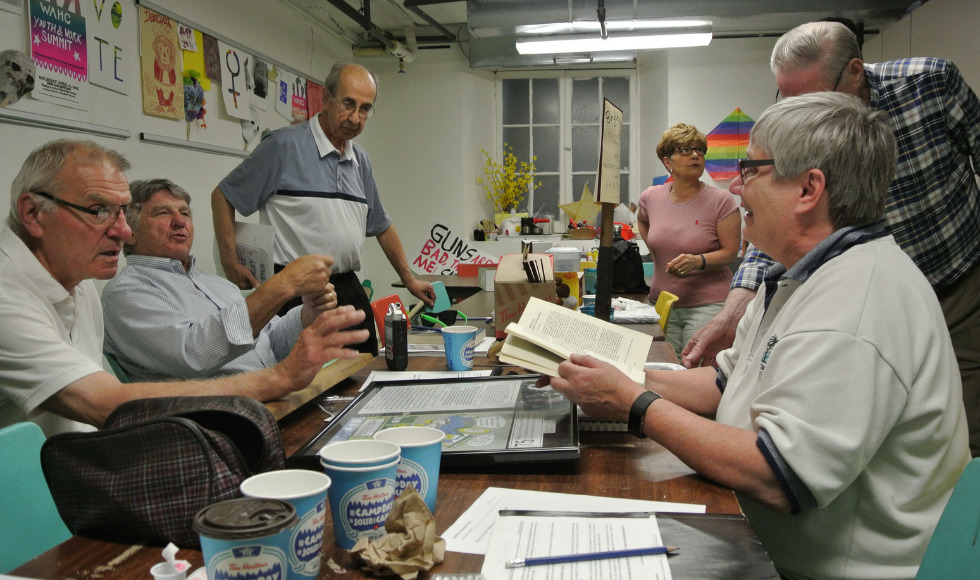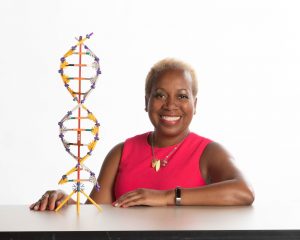2022-23 Recipients: The Niagara HELPS Program Team
Campus Partner(s): Dr. Stephenson Strobel, Dr. Rahat Hossain, Chris Henderson, McMaster University Dept. of Medicine
Community Partner(s): Quest Community Health Centre (Shilpee Rana, Tyler English, Scott Cronkwright), Niagara Health Emergency Departments
The Niagara Homelessness Emergency Liaison and Peer Support (HELPS) program has been operational since late 2019. HELPS began as a prospective trial of peer support navigators with lived experience of homelessness providing services to patients experiencing homelessness in the St. Catharines and Niagara Falls Niagara Health Emergency Departments. Over the course of two years, HELPS has concluded its research phase with McMaster University and now continues in the region as a stand-alone health service in partnership between Quest Community Health Centre and the Niagara Health system, continuing to serve the most vulnerable members of the community based on a model that was originally developed and tested through this community-campus collaboration.
2021-22 Recipients: The Second Heart Project
The Second Heart Project is being recognized for their work in developing a peer-focused and multi-disciplinary harm reduction strategy to integrate peer support workers with lived experience of drug use into the care team for people who use drugs (PWUD) and who are hospitalized for infective endocarditis (IE). Peer support workers can remove barriers to continuity of care and access to care to improve outcomes and experiences of PWUD in hospital settings. Centering peer support workers as essential members of the care team brings members of the community into the care team to better address the unique medical, psychosocial, and health system challenges experienced by this population.
The team is co-led by Drs. Robin Lennox and Leslie Martin and consists of 11 co-investigators in public health, primary care, surgery, internal medicine and infectious disease, 5 medical students/residents and staff from McMaster Family Practice and 3 community members from the Canadian Mental Health Association (cmha.ca) and Keeping Six (keepingsix.org).
Second Heart began with an exploratory qualitative study identified gap and need in community-based care for PWUD experiencing acute illness in Hamilton. Peer support workers were identified as the “bridge” necessary to provide peer support and facilitate trust between PWUD and the health care system. This study led to the development of the university-hospital-community partnership and a proposal to the Hamilton Academic Health Sciences Organization to fund a two-year pilot project which was granted in April 2020.
This project exemplifies a novel yet feasible community-based model of care that puts persons with lived experience of drug use at the centre of a multi-disciplinary health and social services support team for a groups of persons (PWUD with IE) that experience significant barriers in access to health care, and even more so since the COVID-19 pandemic.
2020-21 Recipients: The Brightside Neighbourhood Project
Brightside was a neighbourhood of workers and immigrants that flourished in the shadow of heavy industry in Hamilton’s east end from 1910 until the late 1960s, when it was mostly demolished. Despite having been one of the most diverse and vibrant working-class neighbourhoods in Hamilton’s era of industrial flourishing, many contemporary Hamiltonians have never heard of Brightside.
That’s an excerpt from ‘Notes from The Brightside Neighbourhood Project‘: a collaboration between former residents of the Brightside neighbourhood in Hamilton, local authors, artists, and historians, including McMaster’s Nancy Bouchier, a professor in the department of history. Started in 2017, this research project re-animates memories of the Brightside community and documents history through audio, written, pictorial and digital formats.
For their ongoing collaborative research approach and community engagement, Bouchier and Project facilitator Simon Orpana are the recipients of the President’s Award for Community-Engaged Research.



2019-20 Recipients: Dr. Juliet Daniel & The Olive Branch of Hope
Together, McMaster researcher Juliet Daniel and community advocate Leila Springer are making a difference in the lives of thousands of racialized women.
Daniel, a renowned molecular biologist and professor, has focused much of her research on studying triple negative breast cancer (TNBC) – a particularly aggressive and often fatal form of cancer that disproportionately strikes women of African ancestry.
Springer, the founder and executive director of the Olive Branch of Hope, has spent the past 20 years providing support to Black women in the GTA living with breast cancer.
The two joined forces in 2015, bringing together their unique research and programming strengths to help inform Black women about TBNC and about the risks it poses, particularly to women of African ancestry.
Since then, Daniel and the Olive Branch of Hope have developed a host of educational and fundraising initiatives aimed at increasing awareness of TNBC among women of African ancestry in Hamilton, the GTA, and internationally.

2018-19 Recipients: Grand River at Mohawk
The Grand River Mohawk at McMaster project– developed by a team of community members, as well as faculty, students and staff from McMaster and Six Nations Polytechnic – aims to preserve a dialect of the Mohawk language spoken at Six Nations of the Grand River by only a handful of speakers, most notably, Mohawk Turtle Clan member, Ima Johnson.
Drawing from methodologies and techniques rooted in Indigenous Knowledge and language revitalization scholarship, team members have worked collaboratively to create numerous Mohawk and Cayuga language recordings and resources, such as baking and cooking-themed Mohawk/Cayuga language lessons; the “Mohawk Word of the Day” – a social media and vocabulary sharing project; and a language toolkit to be shared with Ontario universities on how to respectfully approach Indigenous language and teaching when partnering with Indigenous communities.
The project team includes; Mohawk language teacher and Faith Keeper, Ima Johnson; Indigenous and Indigenous Studies students from McMaster and Six Nations Polytechnic, Kate Brown, Laurie Powless, John Hill, Clare Richardson, Mary-Ellen Simon, Geeg Hill, Scott Longboat and Amber Squire, with Indigenous Studies staff support from Josh Dockstator; the faculty supervisor is Rick Monture, associate professor in McMaster’s English and Cultural Studies Department, and past academic director of the Indigenous Studies Program.
2018-19 Recipients: We are Not the Others
We are Not the Others, developed by Mirna Carranza, associate professor in McMaster’s School of Social Work in partnership with Nora López, coordinator, Emergency Support Committee for Refugees; Ines Ríos, executive director of the Immigrants Working Centre; and María Antelo, coordinator of community development at the Hamilton Community Legal Clinic, is a play based on the findings from a research study that aimed to learn how the intersection between acculturation, gender relations and intimate partner violence, intergenerational tensions, trauma, loss and ongoing political fear, and economic exclusion impacts Women Immigrants’ mental health and in particular their socio-economic integration to the Hamilton community.
As part of the study, service providers, families and women immigrants were interviewed, many of whom shared their experiences of reception in formal and informal settings, such as schools and grocery stores, and spoke about their experiences of racism and marginalization. The play used their spoken words, including their laughter and sorrow, to depict both their challenges and hopes. It was co-created with women immigrant themselves, as a way to bring their knowledge and stories to a wider audience.
